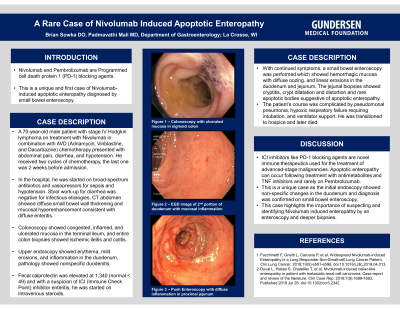Back


Poster Session A - Sunday Afternoon
Category: Small Intestine
A0675 - A Rare Case of Nivolumab-Induced Apoptotic Enteropathy
Sunday, October 23, 2022
5:00 PM – 7:00 PM ET
Location: Crown Ballroom

Has Audio

Brian Sowka, DO
Gundersen Health System
La Crosse, WI
Presenting Author(s)
Brian Sowka, DO, Padmavathi Mali, MD
Gundersen Health System, La Crosse, WI
Introduction: We report a case of Nivolumab induced apoptotic enteropathy in a patient presenting with abdominal pain and diarrhea. Nivolumab and Pembrolizumab are Programmed cell death protein 1 (PD-1) blocking agents. There are very few cases of Pembrolizumab-induced apoptotic enteropathy in the literature. This is a unique and first case of Nivolumab-induced apoptotic enteropathy diagnosed by small bowel enteroscopy.
Case Description/Methods: A 70-year-old male patient with stage IV Hodgkin lymphoma on treatment with Nivolumab in combination with AVD (Adriamycin, Vinblastine, and Dacarbazine) chemotherapy presented with abdominal pain, diarrhea, and hypotension. He received two cycles of chemotherapy, the last one was 2 weeks before admission. In the hospital, he was started on broad-spectrum antibiotics and pressors for sepsis and hypotension. Stool work-up for diarrhea was negative for infectious etiologies. CT abdomen showed diffuse small bowel wall thickening and mucosal hyperenhancement consistent with diffuse enteritis. Colonoscopy showed congested, inflamed, and ulcerated mucosa in the terminal ileum, and entire colon biopsies showed ischemic ileitis and colitis. Upper endoscopy showed erythema, mild erosions, and inflammation in the duodenum, pathology showed nonspecific duodenitis. Fecal calprotectin was elevated at 1340 (normal < 49) and with a suspicion of ICI (Immune Check Point) inhibitor enteritis, he was started on intravenous steroids. With continued symptoms, a small bowel enteroscopy was performed which showed hemorrhagic mucosa with diffuse oozing, and linear erosions in the duodenum and jejunum. The jejunal biopsies showed cryptitis, crypt dilatation and distortion and rare apoptotic bodies suggestive of apoptotic enteropathy. The patient’s course was complicated by pseudomonal pneumonia, hypoxic respiratory failure requiring intubation, and ventilator support. He was transitioned to comfort care and later passed away.
Discussion: ICI inhibitors like PD-1 blocking agents are novel immune therapeutics used for the treatment of advanced-stage malignancies. Apoptotic enteropathy can occur following treatment with antimetabolites and TNF inhibitors and rarely on Pembrolizumab. This is a unique case as the initial endoscopy showed non specific changes in the duodenum and diagnosis was confirmed on small bowel enteroscopy. This case highlights the importance of suspecting and identifying Nivolumab induced enteropathy by an enteroscopy and deeper biopsies.
Disclosures:
Brian Sowka, DO, Padmavathi Mali, MD. A0675 - A Rare Case of Nivolumab-Induced Apoptotic Enteropathy, ACG 2022 Annual Scientific Meeting Abstracts. Charlotte, NC: American College of Gastroenterology.
Gundersen Health System, La Crosse, WI
Introduction: We report a case of Nivolumab induced apoptotic enteropathy in a patient presenting with abdominal pain and diarrhea. Nivolumab and Pembrolizumab are Programmed cell death protein 1 (PD-1) blocking agents. There are very few cases of Pembrolizumab-induced apoptotic enteropathy in the literature. This is a unique and first case of Nivolumab-induced apoptotic enteropathy diagnosed by small bowel enteroscopy.
Case Description/Methods: A 70-year-old male patient with stage IV Hodgkin lymphoma on treatment with Nivolumab in combination with AVD (Adriamycin, Vinblastine, and Dacarbazine) chemotherapy presented with abdominal pain, diarrhea, and hypotension. He received two cycles of chemotherapy, the last one was 2 weeks before admission. In the hospital, he was started on broad-spectrum antibiotics and pressors for sepsis and hypotension. Stool work-up for diarrhea was negative for infectious etiologies. CT abdomen showed diffuse small bowel wall thickening and mucosal hyperenhancement consistent with diffuse enteritis. Colonoscopy showed congested, inflamed, and ulcerated mucosa in the terminal ileum, and entire colon biopsies showed ischemic ileitis and colitis. Upper endoscopy showed erythema, mild erosions, and inflammation in the duodenum, pathology showed nonspecific duodenitis. Fecal calprotectin was elevated at 1340 (normal < 49) and with a suspicion of ICI (Immune Check Point) inhibitor enteritis, he was started on intravenous steroids. With continued symptoms, a small bowel enteroscopy was performed which showed hemorrhagic mucosa with diffuse oozing, and linear erosions in the duodenum and jejunum. The jejunal biopsies showed cryptitis, crypt dilatation and distortion and rare apoptotic bodies suggestive of apoptotic enteropathy. The patient’s course was complicated by pseudomonal pneumonia, hypoxic respiratory failure requiring intubation, and ventilator support. He was transitioned to comfort care and later passed away.
Discussion: ICI inhibitors like PD-1 blocking agents are novel immune therapeutics used for the treatment of advanced-stage malignancies. Apoptotic enteropathy can occur following treatment with antimetabolites and TNF inhibitors and rarely on Pembrolizumab. This is a unique case as the initial endoscopy showed non specific changes in the duodenum and diagnosis was confirmed on small bowel enteroscopy. This case highlights the importance of suspecting and identifying Nivolumab induced enteropathy by an enteroscopy and deeper biopsies.
Disclosures:
Brian Sowka indicated no relevant financial relationships.
Padmavathi Mali indicated no relevant financial relationships.
Brian Sowka, DO, Padmavathi Mali, MD. A0675 - A Rare Case of Nivolumab-Induced Apoptotic Enteropathy, ACG 2022 Annual Scientific Meeting Abstracts. Charlotte, NC: American College of Gastroenterology.
